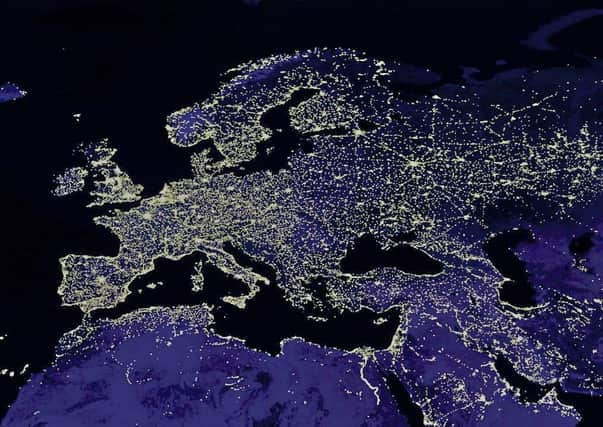Lord Hannan: Europhile fanatics have nothing to say about Protocol except ‘yah-boo-sucks!’


That pretty much is the entirity of the case against the government over the NI Protocol. Ministers and officials keep patiently proposing ways in which the EU’s stated objectives could be met without disrupting Ulster’s economy and unsettling her politics.
“Yeah, well you signed it!”
David Frost and his team point to the harms: the extra costs loaded onto businesses, the trade diversion, the scheduled banning even of medicines.


“Should’ve thought of that before!”
Advertisement
Hide AdAdvertisement
Hide AdThey explain that the application is disproportionate. That there is no way that the EU actually needs to carry out 20% of its external checks on 0.5% of its trade. That there is plainly more going on here than a desire to check what might enter Co Cavan. That Brussels’ insistence on rabies shots for pets was not, by any stretch of the imagination, necessary or proportionate.
“Didn’t you read it before you signed?”
They draw attention to the political implications. They recall that the peace settlement in Northern Ireland rests on two pillars: first, an understanding that nothing important will be done with the support of only one of the two communities; second, a promise that there will be no change in the constitutional status of the Province except by a vote of its own inhabitants.
Yet all three Unionist parties are campaigning against the Protocol, and the surviving author of the Belfast Agreement, David Trimble, says the Protocol breaches its terms.
“Bet they’re feeling silly about backing Brexit now, eh, Unionist numpties!”
Advertisement
Hide AdAdvertisement
Hide AdFrost’s team asks whether the EU is acting in good faith when it is so obviously trying to make life difficult. Its aim – stated publicly and repeatedly – is to force Britain into accepting its agrifoods regulations, so that we can’t buy beef from Australia rather than France or Ireland. Is this really a reasonable position?
“Well, you signed it!”
This has been the response, not just of online #FBPE maniacs, but of Europhile columnists, Irish politicians, Labour and LibDem front-benchers and, not least, EU negotiators. The reaction to Lord Frost’s temperate well-reasoned speech in Lisbon was a case in point. Rather than disagreeing with anything he had said, his opponents fell back on their favourite yah-boo attack line.
“The same minister who, just months ago, was trumpeting the Government’s botched Brexit deal now says it’s intolerable and has to be changed,” said Alistair Carmichael for the Lib Dems.
Yup, agreed Labour’s Jenny Chapman, it was “the agreement he negotiated – and the prime minister signed – just two years ago”.
Advertisement
Hide AdAdvertisement
Hide Ad“The absolute state of David Frost trashing the deal he negotiated + hailed as a triumph,” Tweeted Gavin Barwell.
“It is a fact that Lord Frost negotiated the protocol, agreed to its terms and backed Boris Johnson’s campaign to sell it during the last general election,” said Matthew O’Toole for the SDLP, just in case we had missed the point.
OK, guys, we get it. But your argument is enormously telling in two ways.
First, it exposes a total lack of interest in addressing the problems. Even now, more than five years after the referendum, Eurocrats are chiefly interested in teaching us a lesson. They want there to be a visible price for Brexit, and if that price is an economic and political crisis in Northern Ireland, tant pis.
Advertisement
Hide AdAdvertisement
Hide AdThat much, perhaps, is not entirely surprising. There were always Euro-zealots for whom Brexit was an act of sacrilege that called for chastisement. What is surprising – or at least would have been five years ago – is that a section of the British commentariat was so unbalanced by the referendum result that it now automatically sides with the EU, however petulant, self-contradictory, or unreasonable its position.
No one in Northern Ireland is pro-Protocol. My parliamentary select committee has been taking evidence for months. We have heard from Leavers and Remainers, Unionists and nationalists, Leftists and Rightists. Some oppose the Protocol on principle, some see it as the price of Brexit. But no one – no one – actively likes it.
Yet, while the British government is actively seeking to address local concerns in ways that will avoid a hard border and give the EU the guarantees it says it needs, its opponents are still playing games of the well-who’s-sorry-now kind.
That reaction is telling in another way. “You signed it” is a far weaker argument than its exponents seem to realise.
Advertisement
Hide AdAdvertisement
Hide AdMost treaties are now defunct. Either they lapsed, or they were renounced by one party or the other, or they were overtaken by events. Where, now, is the Triple Alliance? Where is the 1914 Bryan-Chamorro Treaty, giving the United States first refusal on any canal built across Nicaragua? Where is the 1936 Anglo-Egyptian Treaty, guaranteeing a British military presence at the Suez Canal? Where is the Warsaw Pact?
Imagine a list of every international accord, going back to the Peace of Callias between the Delian League and Achaemenid Persia in the fifth century BC. How many of them are still in force? 1%? Less?
Consider an example that seems apt given its subject matter, and given the fact of this being its centenary year. The Anglo-Irish Treaty of 1921, which recognised Irish independence, came with a number of conditions, including an oath of loyalty to the monarch, continuing British access to three ports and much else.
Once independence had been secured, successive Irish governments progressively dismantled those conditions, breaking their residual constitutional links with the UK, leaving the Commonwealth and declaring a republic.Britain, for what it’s worth, reacted with equanimity. When the final rupture was made in 1949, George VI sent a warm message to the Irish President: “I hold in most grateful memory the services and sacrifices of the men and women of your country who rendered gallant assistance to our cause in the recent war and who made a notable contribution to our victories. I pray that every blessing may be with you today and in the future.”
Advertisement
Hide AdAdvertisement
Hide AdThe EU is unlikely to be so affable. But the argument that Ireland used was a familiar one, namely that it had signed a treaty under duress, sought to make it work, found it intolerable, and so was abandoning it.
Obviously, Britain did not fight a war to get out of the EU. But there is no way that it would have agreed to the Northern Ireland Protocol had not a majority of MPs been working with Brussels to sabotage Brexit. The Protocol was the product of the Benn Act. Indeed, it was only after Theresa May lost the 2017 election that the EU proposed the outrageous idea that the UK should surrender jurisdiction over part of its territory.
As Frostie put it in Lisbon, it was agreed during “a moment of EU overreach when the UK’s negotiating hand was tied” – a point that no one has seriously disputed. Which makes it rather rich for those MPs who were doing the hand-tying in 2019 to complain now.
Could Britain simply annul parts of the Protocol, as Ireland did with the 1921 treaty? Yes – and it should.
Advertisement
Hide AdAdvertisement
Hide AdTriggering Article 16 is an inadequate solution, leaving many objectionable arrangements in place. It is a measure of the loopiness of Brussels negotiators and, even more, of their British cheerleaders, that making use of a treaty clause agreed to by the EU and intended for precisely such circumstances as now is howled down as a breach of faith.
If the EU is threatening retaliation over a measure foreseen in the Protocol – a measure invoked by the EU in February from no higher motive than pique at Britain’s vaccination programme – then we might as well be hanged for a sheep as for a lamb, abrogate the whole deal and replace it with something more workable.
Outright repudiation would allow us to put new arrangements in place, proving that there is no need for border infrastructure in Ireland and ensuring that future talks began from that fact. The sooner we act, the better.
Daniel Hannan of Kingsclere is a Conservative peer, writer and columnist.
Advertisement
Hide AdAdvertisement
Hide AdHe was a Tory MEP from 1999 to 2020, and is now President of the Initiative for Free Trade.
This piece first appeared on the website Conservative Home
More from the News Letter:
A message from the Editor:
Thank you for reading this story on our website. While I have your attention, I also have an important request to make of you.
Advertisement
Hide AdAdvertisement
Hide AdWith the coronavirus lockdown having a major impact on many of our advertisers - and consequently the revenue we receive - we are more reliant than ever on you taking out a digital subscription.
Subscribe to newsletter.co.uk and enjoy unlimited access to the best Northern Ireland and UK news and information online and on our app. With a digital subscription, you can read more than 5 articles, see fewer ads, enjoy faster load times, and get access to exclusive newsletters and content.
Visit www.newsletter.co.uk/subscriptions now to sign up.
Our journalism costs money and we rely on advertising, print and digital revenues to help to support them. By supporting us, we are able to support you in providing trusted, fact-checked content for this website.
Ben Lowry
Editor